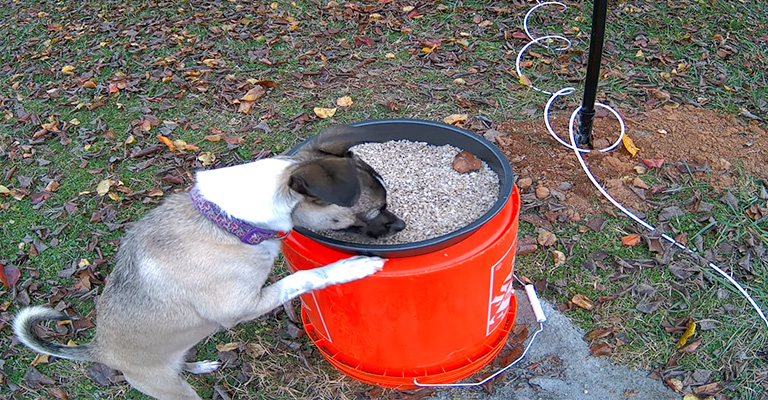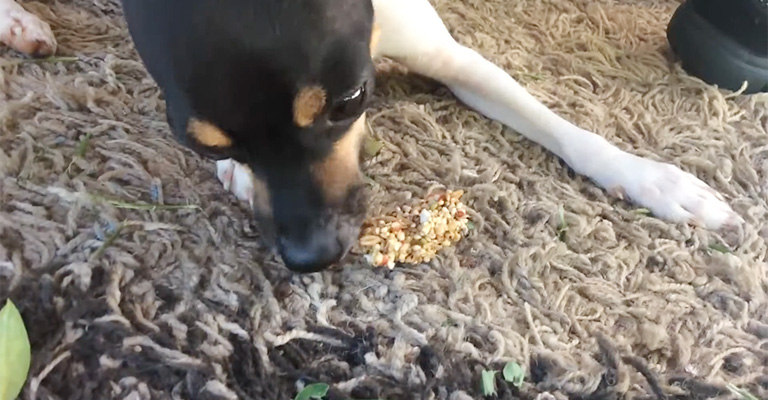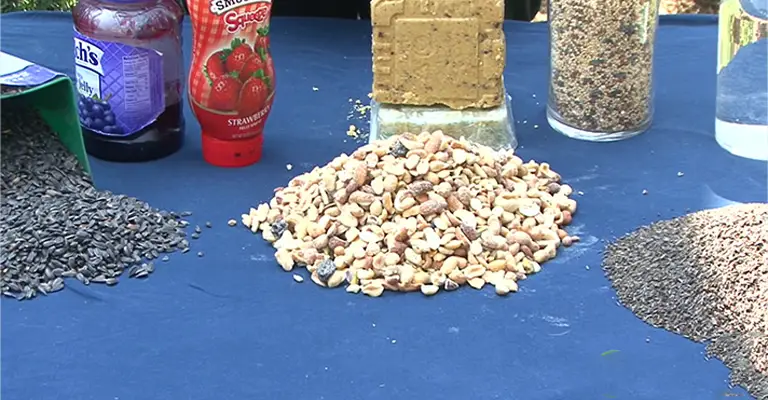The scenario is a familiar one for many pet owners: you step outside to enjoy the beauty of your garden, only to find your dog happily munching on bird seed scattered beneath your bird feeders.
While it may seem harmless, this behavior can raise concerns about your dog’s health and the well-being of your feathered garden visitors. So, dog eats birdseed- what do I do?
In this exploration, we delve into the practical steps and strategies to address this situation effectively.
From training and supervision to creative deterrents and pet-friendly bird seed choices, we offer a comprehensive guide on how to manage this common challenge.
By understanding the reasons behind your dog’s attraction to bird seed and implementing the right solutions, you can strike a balance between your love for both your canine companion and the avian guests in your garden.

Dog Eats Birdseed- What Do I Do?
When your dog indulges in bird seed, it can be a concern for both their health and your garden’s avian visitors.
Here are some tips to address this situation:
Monitor Your Dog
Keep a close eye on your dog to ensure they don’t consume a large quantity of bird seed in a short time. This can lead to digestive issues or blockages.
Remove Access
Prevent access to the bird seed by placing it in an elevated feeder or hanging it from a tree branch. Make it physically challenging for your dog to reach.
Train Your Dog
Teach your dog the “leave it” or “drop it” command. Consistent training can help deter them from approaching the birdseed.
Supervise Outdoor Time
When your dog is outside, supervise their activities to ensure they don’t have unsupervised access to the birdseed.
Create a Designated Play Area
Establish a specific play area for your dog, away from the bird feeders. Use positive reinforcement to encourage play in this designated space.
Distraction Toys
Offer engaging toys or puzzles to keep your dog mentally stimulated and focused on play rather than scavenging for bird seed.
Consult a Veterinarian
If your dog consumes a significant amount of bird seed or exhibits signs of distress, consult your veterinarian immediately. They can assess the situation and provide guidance.
Fence Off the Garden
Consider fencing off the garden or bird feeder area to create a physical barrier between your dog and the bird seed.
Use Pet-Friendly Bird Seed
Opt for birdseed blends that are less appealing to dogs, and avoid ingredients like peanuts or high-fat content that might attract them.
By implementing these tips, you can prevent your dog from consuming bird seed, ensuring their well-being and maintaining a harmonious environment for both your pets and your garden’s feathered visitors.
Why Does My Dog Eat Birdseed?

Dogs are omnivorous animals that can eat a variety of foods, but they may also have some reasons for eating birdseed.
Here are some causes of why your dog eats birdseed:
Hunger
One of the most common and simple causes of why your dog eats birdseed is hunger.
Your dog may not be getting enough food or nutrition from their regular diet, so they may resort to eating bird seed to fill their stomach or satisfy their appetite.
You should make sure that your dog has a balanced and adequate diet that meets their needs and preferences.
Curiosity
Another cause of why your dog eats birdseed is curiosity. Your dog may be intrigued by the smell, taste, or texture of the bird seed, and they may want to explore or try it out.
Dogs are naturally curious and adventurous animals, and they may eat anything that catches their attention or interest.
Boredom
A third cause of why your dog eats birdseed is boredom. Your dog may not have enough stimulation or entertainment in their environment, so they may eat birdseed to pass the time or have some fun.
Dogs need physical and mental exercise to keep them happy and healthy, and they may eat birdseed as a way to cope with boredom or frustration.
Anxiety
A fourth cause of why your dog eats birdseed is anxiety. Your dog may be stressed or nervous about something in their surroundings, such as loud noises, strangers, or separation from you.
Dogs may eat bird seeds as a way to calm themselves down or distract themselves from their anxiety.
Pica
A fifth cause of why your dog eats birdseed is pica. Pica is a condition where dogs eat non-food items, such as dirt, rocks, or paper.
Pica can be caused by various factors, such as nutritional deficiencies, medical problems, behavioral issues, or genetic predisposition.
Dogs may eat bird seed as a form of pica, especially if they lack certain minerals or vitamins in their diet.
Coprophagia
A sixth cause of why your dog eats bird seed is coprophagia. Coprophagia is a condition where dogs eat feces, either their own or other animals.
Coprophagia can be caused by various factors, such as hunger, curiosity, boredom, anxiety, or learned behavior.
Dogs may eat bird seed that has been contaminated by bird droppings as a form of coprophagia, especially if they find it appealing or rewarding.
Allergies
A seventh cause of why your dog eats bird seed is allergies. Your dog may be allergic to something in their regular food, such as wheat, corn, soy, or chicken.
This can cause them to have itching, rashes, vomiting, diarrhea, or other symptoms.
Dogs may eat bird seed as a way to avoid or relieve their allergies, especially if the bird seed does not contain the allergens that trigger them.
Dental Problems
An eighth cause of why your dog eats bird seed is dental problems. Your dog may have tooth decay, gum disease, or other dental issues that make it painful or difficult for them to chew their normal food.
Dogs may eat birdseed as a way to soothe or clean their teeth, especially if the birdseed is crunchy or abrasive.
Habit
A ninth cause of why your dog eats birdseed is a habit. Your dog may have developed a habit of eating bird seed over time, either because they enjoy it, because they are used to it, or because they associate it with something positive.
Dogs may eat bird seeds as a way to maintain or reinforce their habit, especially if they have been doing it for a long time.
How Do I Stop My Dogs From Eating Birdseed?

Stopping dogs from eating birdseed can be challenging, but with consistent training and preventive measures, you can discourage this behavior.
Here are the solutions:
Supervise and Correct
When your dog approaches the bird seed, supervise their behavior and correct them with a firm “No” or “Leave it” command. Be consistent and patient.
Use Positive Reinforcement
Praise and reward your dog when it ignores the bird seed. Positive reinforcement reinforces desirable behavior.
Designated Play Area
Create a designated play area for your dog away from the bird feeder. Encourage play and exercise in this space to divert their attention.
Elevate or Relocate Feeders
Hang bird feeders high enough to be out of your dog’s reach or place them in areas inaccessible to your dog, such as fenced sections of the garden.
Bitter Spray
Apply a pet-safe bitter spray on or around the bird feeders. The taste will discourage your dog from attempting to eat the seeds.
Physical Barriers
Install physical barriers, like fencing or garden borders, to prevent your dog from accessing the birdseed area.
Training Commands
Invest time in teaching essential commands like “Stay” and “Come.” These commands can help you control your dog’s behavior near bird feeders.
Scare Tactics
Use motion-activated devices or garden ornaments that make noise or sudden movements when your dog approaches the bird feeder area. This can startle them and deter future attempts.
Pet-Friendly Bird Seed
Choose birdseed blends that are less appealing to dogs. Opt for varieties without high-fat ingredients like peanuts, which can attract your dog.
Consistency is key when implementing these solutions. Over time, your dog will learn that the bird seed area is off-limits, allowing both your feathered visitors and your canine companion to coexist harmoniously.
FAQ
If your dog consumes birdseed, monitor them for any signs of discomfort or digestive issues.
Train them to avoid the area, use positive reinforcement, and consider deterrents or elevated bird feeders to prevent future incidents.
Birdseed itself is not inherently harmful to dogs, but overconsumption can lead to digestive problems.
The real concern is the potential contamination of bird seed with mold or bacteria, which can be harmful.
To prevent your dog from eating bird seed, supervise them outdoors, train them with commands like “Leave it,” and use positive reinforcement. You can also relocate or elevate bird feeders and apply pet-safe deterrents.
If your dog shows signs of illness, such as vomiting, diarrhea, or lethargy, contact your veterinarian immediately. Inform them about the bird seed ingestion for appropriate guidance and treatment.
Yes, you can have bird feeders if you have a dog. Use preventive measures like training, supervision, and deterrents to ensure your dog doesn’t eat the bird seed, allowing you to enjoy both your feathered guests and your canine companion.
Conclusion
In the harmonious tapestry of a garden shared by dogs and birds, the question of what to do when your dog eats birdseed finds its answer through a blend of patience, training, and preventive measures.
As we conclude our exploration, it becomes evident that with consistent effort and a commitment to positive reinforcement, you can deter your dog from indulging in bird seed and protect the well-being of both your pet and your garden’s feathered friends.
The key lies in proactive supervision, the implementation of training commands, and the use of deterrents when necessary.
Additionally, opting for pet-friendly bird seed blends can minimize your dog’s interest in these tasty morsels. In the end, it’s about striking a balance between the enjoyment of your outdoor space, your beloved pet, and the natural world that graces your garden.